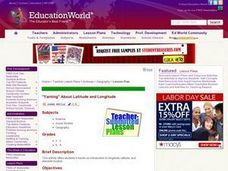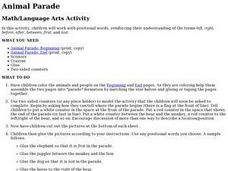Curated OER
Volcanic Activity in the U.S.
Students locate and map ten volcanoes in United States, create chart comparing volcanoes by last eruption, type of volcano, location, and interesting fact, and create Powerpoint slide show describing basic
information about volcanoes and...
Curated OER
"Yarning" About Latitude and Longitude
Students identify various locations using latitude and longitude. In this map skills activity, students use yarn and labels to create a "human globe." Students identify the Prime Meridian, the Equator, and Northern and Southern Hemisphere.
Curated OER
Countries of the World
Students identify countries on a world map. In this map skills lesson, students define the word "country" and use post-it notes to locate several countries on a world map.
Curated OER
The Middle Passage
Eighth graders locate the Middle passage and describe the experiences of slaves in the Middle Passage. In this Middle Passage lesson, 8th graders describe life as a slave during the Middle Passage. Students write as if they were a...
Curated OER
Where in the World? :Understanding Latitude and Longitude
Students play a grid-based game and devise clues to help classmates locate spots on the globe in order to recognize the value of using longitude and latitude for identifying locations.
Curated OER
Measurement and Data Collecting using Image Processing
Students trace the route of the historical event and measure the distance over which the people involved journeyed. A data sheet be constructed outlining the location of events, and the speed with which the journey occurred.
Curated OER
Charlotte's Web
Fourth graders focus on fluency by reading the book Charlotte's Web. In this reading strategies lesson, 4th graders partner read, do guided reading, and independent reading to increase fluency. Students use Venn Diagrams, discuss cause...
Curated OER
Christopher Columbus, The Explorer
Students brainstorm important facts about Christopher Columbus, input information into Kidspiration or Inspiration, watch United Streaming Video on Christopher Columbus and New World to gather information, research online to find...
Curated OER
Eating Plants
Students identify parts of a plant. In this life science lesson, student groups locate the leaves and fruits on vegetables, then find the roots. Lesson includes extension activities and background teacher information.
Curated OER
Unlikely Communicators: Carrier Pigeons
Second graders explore information about carrier pigeons and other means of communication. They describe different types of communication and transportation and identify their advantages and disadvantages They develop a Communication...
Curated OER
Create the Ideal City
Students examine the significance of city planning. They analyze maps, develop a crossword puzzle using vocabulary terms, and create a diagram of an ideal city and describe the features that make it healthy for the economy, the...
Curated OER
Food Chains and Food Webs
Fourth graders investigate food chains. In this living environment lesson plan, 4th graders begin to understand the interdependence of organisms. Students describe the connections organisms have to the ecosystem. Students research...
Curated OER
Rollin' on The River - the Hudson River!
Students examine how the Hudson River was important to the development of the United States. They examine the role of steamboats played in the development of the Hudson River Valley.
Curated OER
Animal Parade
In this activity, students will work with positional words, reinforcing their understanding of the terms; left, right, before, after, between, first, and last.
Curated OER
911 Emergency
Learners role play 911 emergency phone calls. In this health lesson, students first discuss the difference between emergencies and non-emergencies, and then role play given scenarios about what to say in an emergency situation to a 911...
Curated OER
Motion: Speed, Velocity, Acceleration and Networking
Students interpret a variety of motion graphs. In this physics lesson, students calculate the speed and acceleration of objects using numerical data from graphs. They apply what they have learned to solve real world problems.
Curated OER
Tell a Totem Story
Students study and view pictures of Native American totem poles on the internet. They create totem poles using PowerPoint that represent their family histories using symbols to designate historic events.
Curated OER
African Clay Masks
Students create a clay mask with African characteristics. They discuss what masks are used for. They draw a picture of their own African mask. They apply features to their masks by scoring and applying slip.
Curated OER
The Tropical Rain Forest
Students use various web sites to access information about the rain forest. They use the Tropical Rainforest Interactive CD to make their own rain forest pictures and stories and learn facts about the rain forest. They use various books...
Curated OER
Dr. Suess's ABC
Students complete a variety of activities related to the book "Dr. Seuss's ABC." They discuss the imaginary animals from the book and create a drawing of their own animal for the letter Z, and locate each letter on an alphabet chart...
Curated OER
Adding and Subtracting Integers
In this online interactive integers instructional activity, 4th graders solve 8 addition and subtraction integer math problems and problem solve 6 integers problems involving numbers from -20 to 20. Students check their answers online...
Curated OER
Comprehension-Characters/characterization
Fifth graders discuss characterization as well as to define antagonist and protagonist. In this language arts lesson, 5th graders write questions for an interview of a character in the book "The Three Little Pigs" and then answer them....
Curated OER
Ocean Grazers: Class Field Trip
Young scholars explore biology by participating in a field trip. In this oceanography lesson, students define the survival characteristics of bottom dwelling creatures also known as ocean grazers. Young scholars attend a class field trip...
Curated OER
Vocabulary: Variety and Venture
Students locate the definitions and synonyms using a variety of activities that involve handheld computers and specific software. They read and discuss definitions, and create an illustration/animation for assigned words.

























